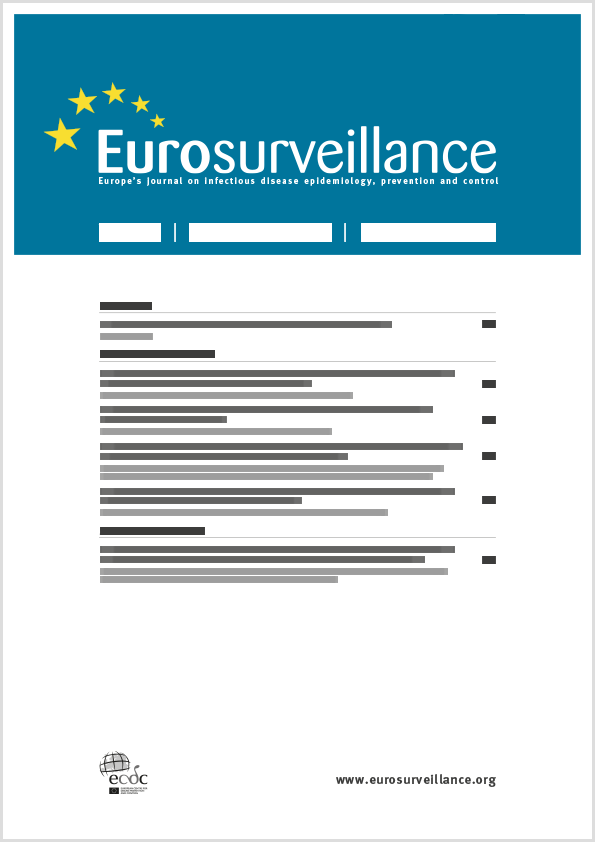- Home
- Eurosurveillance
- Previous Issues
- Volume 28, Issue 2, 12/Jan/2023
Eurosurveillance - Volume 28, Issue 2, 12 January 2023
Volume 28, Issue 2, 2023
- Editorial
- Rapid communication
-
-
-
Genomic surveillance of SARS-CoV-2 positive passengers on flights from China to Italy, December 2022
Federica Novazzi , Emanuela Giombini , Martina Rueca , Andreina Baj , Lavinia Fabeni , Angelo Genoni , Francesca Drago Ferrante , Giulia Gramigna , Cesare Ernesto Maria Gruber , Sara Boutahar , Claudia Minosse , Ornella Butera , Renee Pasciuta , Daniele Focosi , Alberto Colombo , Andrea Antinori , Enrico Girardi , Francesco Vaia and Fabrizio MaggiMore LessWith numbers of COVID-19 cases having substantially increased at the end of 2022 in China, some countries have started or expanded testing and genomic surveillance of travellers. We report screening results in Italy in late December 2022 of 556 flight passengers in provenance from two Chinese provinces. Among these passengers, 126 (22.7%) tested SARS-CoV-2 positive. Whole genome sequencing of 61 passengers’ positive samples revealed Omicron variants, notably sub-lineages BA.5.2.48, BF.7.14 and BQ.1.1, in line with data released from China.
-
- Top
-
- Research
-
-
-
Dengue, chikungunya and Zika virus infections among Dutch travellers to Suriname: a prospective study during the introduction of chikungunya and Zika virus, 2014 to 2017
More LessBackgroundSuriname, a country endemic for dengue virus (DENV), is a popular destination for Dutch travellers visiting friends and relatives and tourist travellers. Chikungunya and Zika virus (CHIKV, ZIKV) were introduced in 2014 and 2015, respectively. Data on infection risks among travellers are limited.
AimWe aimed to prospectively study incidence rate (IR) and determinants for DENV, ZIKV and CHIKV infection in adult travellers to Suriname from 2014 through 2017.
MethodsParticipants kept a travel diary and were tested for anti-DENV, anti-ZIKV and anti-CHIKV IgG antibodies (Euroimmun). Selected samples were subjected to an in-house DENV and ZIKV PRNT50. The IR (infections/1,000 person-months of travel) and IR ratio and determinants for infection were calculated.
ResultsTravel-acquired infections were found in 21 of 481 participants: 18 DENV, four ZIKV and two CHIKV, yielding an IRDENV of 47.0 (95% CI: 29.6–74.6), IRZIKV of 11.6 (95% CI: 4.4–31.0) and IRCHIKV of 5.6 (95% CI: 1.4–22.2)/1,000 person-months. In nine DENV and three ZIKV infected participants, infections were PRNT50-confirmed, yielding a lower IRDENV of 23.3 (95% CI: 12.1–44.8) and an IRZIKV of 8.4 (95% CI: 2.7–26.1) per 1,000 person-months. Tourist travel was associated with DENV infection. ZIKV and CHIKV infections occurred soon after their reported introductions.
ConclusionsDespite an overestimation of serologically confirmed infections, Dutch travellers to Suriname, especially tourists, are at substantial risk of DENV infection. As expected, the risk of contracting ZIKV and CHIKV was highest during outbreaks. Cross-reaction and potential cross-protection of anti-DENV and -ZIKV antibodies should be further explored.
-
- Top
-
- Outbreaks
-
-
-
Countrywide multi-serotype outbreak of Salmonella Bovismorbificans ST142 and monophasic Salmonella Typhimurium ST34 associated with dried pork sausages in France, September 2020* to January 2021
More LessThe French National Reference Centre for Escherichia coli, Shigella and Salmonella (FNRC-ESS) detected two human clusters of 33 cases (median age: 10 years; 17 females) infected by Salmonella enterica serotype Bovismorbificans, ST142, HC5_243255 (EnteroBase HierCC‑cgMLST scheme) in September–November 2020 and of 11 cases (median age: 11 years; seven males) infected by S. enterica serotype 4,12:i:-, ST34, HC5_198125 in October–December 2020. Epidemiological investigations conducted by Santé publique France linked these outbreaks to the consumption of dried pork sausages from the same manufacturer. S. Bovismorbificans and S. 4,12:i:- were isolated by the National Reference Laboratory from different food samples, but both strains were identified in a single food sample only by qPCR. Three recalls and withdrawals of dried pork products were issued by the French general directorate of food of the French ministry for agriculture and food in November 2020, affecting eight supermarket chains. A notification on the European Rapid Alert System for Food and Feed and a European urgent enquiry on the Epidemic Intelligence Information System for Food and Waterborne Diseases and Zoonoses (EPIS-FWD) were launched. No cases were reported outside France. Outbreaks caused by multiple serotypes of Salmonella may go undetected by protocols in standard procedures in microbiology laboratories.
-
- Top
-
- Miscellaneous
-
Volumes & issues
-
Volume 30 (2025)
-
Volume 29 (2024)
-
Volume 28 (2023)
-
Volume 27 (2022)
-
Volume 26 (2021)
-
Volume 25 (2020)
-
Volume 24 (2019)
-
Volume 23 (2018)
-
Volume 22 (2017)
-
Volume 21 (2016)
-
Volume 20 (2015)
-
Volume 19 (2014)
-
Volume 18 (2013)
-
Volume 17 (2012)
-
Volume 16 (2011)
-
Volume 15 (2010)
-
Volume 14 (2009)
-
Volume 13 (2008)
-
Volume 12 (2007)
-
Volume 11 (2006)
-
Volume 10 (2005)
-
Volume 9 (2004)
-
Volume 8 (2003)
-
Volume 7 (2002)
-
Volume 6 (2001)
-
Volume 5 (2000)
-
Volume 4 (1999)
-
Volume 3 (1998)
-
Volume 2 (1997)
-
Volume 1 (1996)
-
Volume 0 (1995)
Most Read This Month

-
-
Detection of 2019 novel coronavirus (2019-nCoV) by real-time RT-PCR
Victor M Corman , Olfert Landt , Marco Kaiser , Richard Molenkamp , Adam Meijer , Daniel KW Chu , Tobias Bleicker , Sebastian Brünink , Julia Schneider , Marie Luisa Schmidt , Daphne GJC Mulders , Bart L Haagmans , Bas van der Veer , Sharon van den Brink , Lisa Wijsman , Gabriel Goderski , Jean-Louis Romette , Joanna Ellis , Maria Zambon , Malik Peiris , Herman Goossens , Chantal Reusken , Marion PG Koopmans and Christian Drosten
-
- More Less


